 Petzlover
Petzlover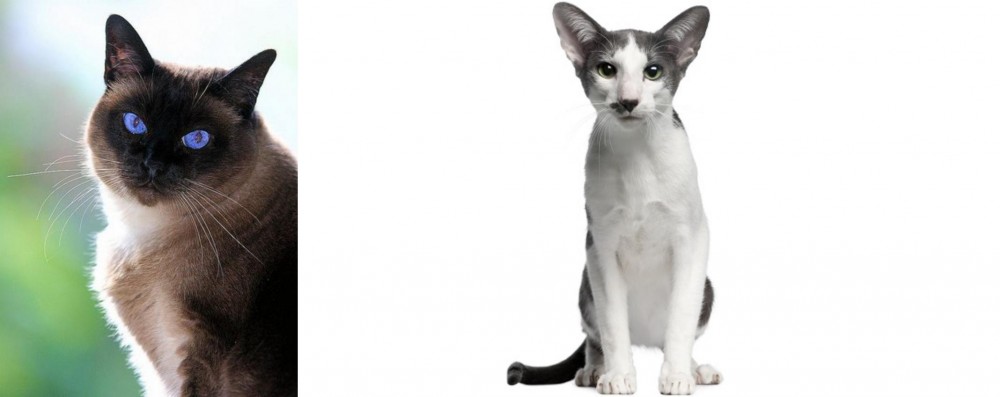 Applehead Siamese is originated from Thailand but Oriental Bicolour is originated from United States. Both Applehead Siamese and Oriental Bicolour are having almost same weight. Applehead Siamese may live 10 years more than Oriental Bicolour. Both Applehead Siamese and Oriental Bicolour has same litter size. Both Applehead Siamese and Oriental Bicolour requires Low Maintenance.
Applehead Siamese is originated from Thailand but Oriental Bicolour is originated from United States. Both Applehead Siamese and Oriental Bicolour are having almost same weight. Applehead Siamese may live 10 years more than Oriental Bicolour. Both Applehead Siamese and Oriental Bicolour has same litter size. Both Applehead Siamese and Oriental Bicolour requires Low Maintenance.
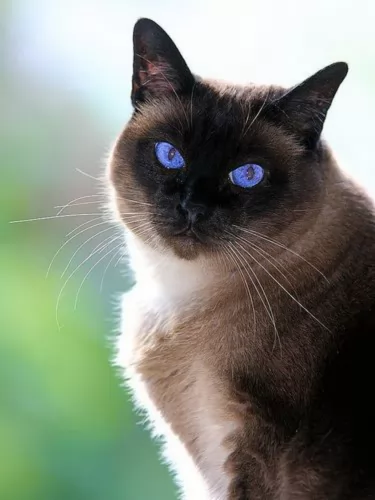 As the traditional Siamese cats from Siam, now known as Thailand, this ancient breed of cat goes back to 1350AD. It is believed that these Traditional Siamese cats were first exported to the west in the 19th century.
As the traditional Siamese cats from Siam, now known as Thailand, this ancient breed of cat goes back to 1350AD. It is believed that these Traditional Siamese cats were first exported to the west in the 19th century.
The Applehead is a Siamese cat that looks the way Siamese looked when they were first brought out to the United States in the 19th century. Breeding with other cat breeds is what developed the Applehead Siamese.
The Applehead seal point was also imported to Britain. Breeders have developed other point colors and head shapes by cross-breeding long- and short hairs, but all Siamese are essentially bred from the Applehead seal point.
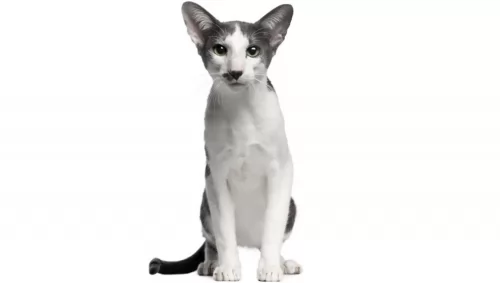 Oriental Bicolour cats owe their origins to Lindajean Grillo of Ciara Cattery. The cats hail from the United States. It was in 1979 that Grillo paired a Siamese and bicolored American Shorthair, selecting the best bicolored offspring to mate again with Siamese or Orientals.
Oriental Bicolour cats owe their origins to Lindajean Grillo of Ciara Cattery. The cats hail from the United States. It was in 1979 that Grillo paired a Siamese and bicolored American Shorthair, selecting the best bicolored offspring to mate again with Siamese or Orientals.
This particular variety was granted recognition in 1983 by TICA. It was during the 1980s that European breeders started their own Oriental bicolor breeding lines. The first modern Oriental Bicolours were imported to the UK during 2004.
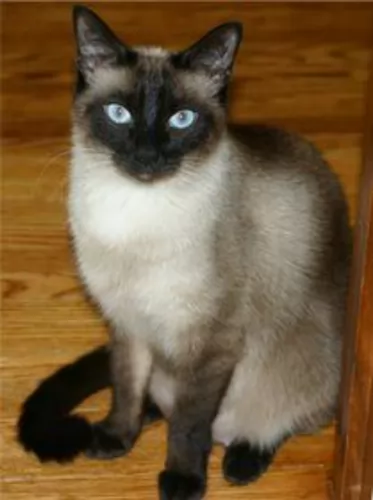 There is no denying that the very recognizable Siamese cats are one of the most popular cat breeds there are, known also for being very vocal.
There is no denying that the very recognizable Siamese cats are one of the most popular cat breeds there are, known also for being very vocal.
The female Applehead weighs between 3 and 5kg and the male might weight a bit more, as much as 6,8kg.
Siamese cats are all born white but as they mature they develop their deeper color points. There are actually 3 types of Siamese cats, with the Traditional Siamese being known as the Apple Head - the original breed of Siamese.
This particular Siamese is a bit bigger and larger-boned than the modern Siamese, with the body being more muscular and heavier. The head of the cat is fairly round- or apple-shaped with the eyes also being somewhat rounder than other types of cats.
The legs are long and the tail long too and the cat has a fairly short, silky coat.
These cats look intelligent and they are, so much so, that it will be important to present them with lots of toys that make them think and require some skills.
They also love receiving attention from their human owners and although they are also vocal, they don’t talk as much as the modern Siamese cats.
They're curious and playful and don’t like being left alone for too long. They also get on well with children and other pets in the home but are inclined to become more attached to one particular person, wanting to follow their favorite human around.
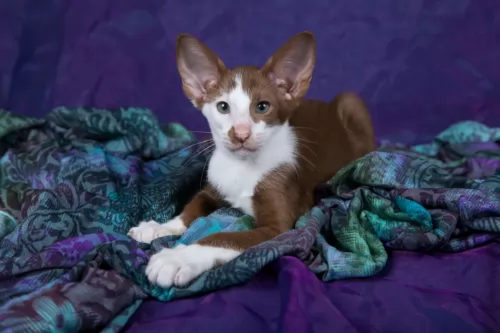 These cats with a triangular-shaped head and slender, long body have a fairly thin tail. The ears are widely set and are large. The eyes are green, but blue with the colorpoint varieties.
These cats with a triangular-shaped head and slender, long body have a fairly thin tail. The ears are widely set and are large. The eyes are green, but blue with the colorpoint varieties.
The coat is short, close-lying and sleek while the coat of the long-haired variety is fine and silky with no thick undercoat. The tail forms a plume. The coat is mostly white and the other part of the coat can be in any other color. You’ll always see quite a bit of white around the legs.
These cats are suited for singles, couples, families, and seniors - in fact, anyone still active enough to provide this cat with lots of attention.
These vibrant cats are known for their social, friendly and loving personality. They are intelligent, inquisitive, active cats that need to have plenty of interaction with their human family members. They love their human family and love to hold conversations with them.
They're entertaining too, and love nothing more to ve the center of attention. They're so into their human family that you may even have him waiting patiently for you to come home fro work. He shouldn't be left alone for hours on end and should rather have a pet friend to keep him company during the day.
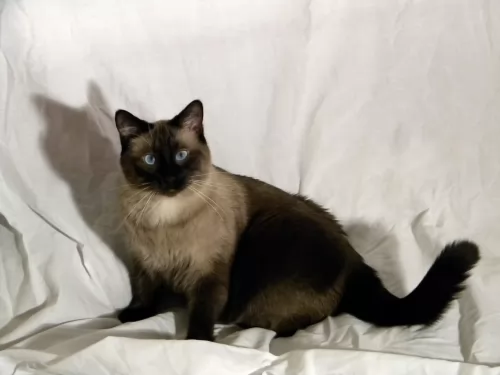 Applehead Siamese cats are very friendly and loving pets. They are intelligent and very beautiful too, with their amazing blue eyes.
Applehead Siamese cats are very friendly and loving pets. They are intelligent and very beautiful too, with their amazing blue eyes.
You will enjoy their friendship as they are prepared to become totally devoted to you, and of course, your playful cat will provide you with lots of laughs and entertainment too. The Applehead Siamese is known to make a splendid pet for you and once you've owned one, you'll think twice before getting another cat breed.
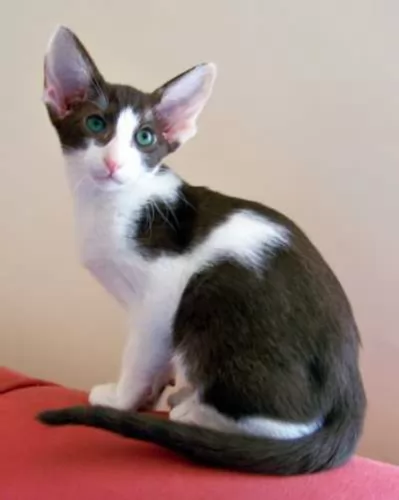 The Oriental Bicolor is such a wonderful pet to have. They are intelligent, entertaining, loving, active, playful, and inquisitive.
The Oriental Bicolor is such a wonderful pet to have. They are intelligent, entertaining, loving, active, playful, and inquisitive.
They’re also athletic and energetic. These cats have got all the characteristics you want in a good friend. They make a fantastic companion to people who are active and happy. They’re also very vocal and have a lot to say to their human family.
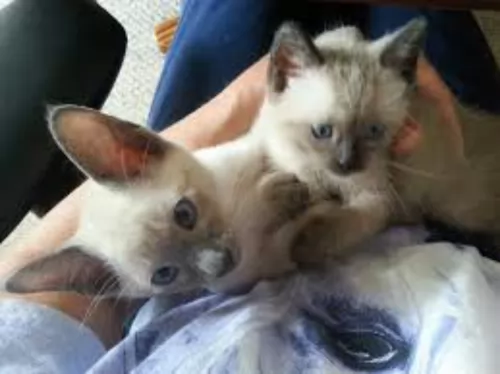 These are a healthy breed of cat and they have always been known to live longer than the modern Siamese cats.
These are a healthy breed of cat and they have always been known to live longer than the modern Siamese cats.
With good care they can live to be up to 20 to 25 years of age. Good nutrition and a loving environment can help to eliminate diseases that the Siamese might have to endure. Some of these can be a blockage in the stomach, skin cancer, feline diabetes, hip dysplasia, and disrupted visual pathway which causes a squint.
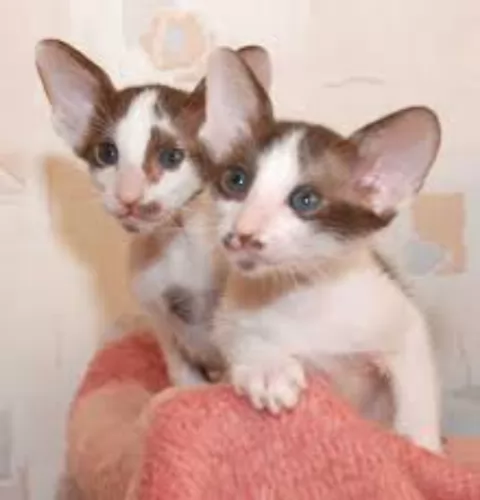 Any cat can develop health problems. Even kittens that come with a certificate of health can develop illnesses that you never thought possible.
Any cat can develop health problems. Even kittens that come with a certificate of health can develop illnesses that you never thought possible.
Orientals are generally healthy cats, but the health issues that may affect the Oriental are similar to that of the Siamese cat.
One of these is Progressive Retinal Atrophy (PRA). This is a genetic eye problem that can lead to blindness. Another disease to look out for is Asthma. The Siamese is susceptible to this disease which means your Oriental Bicolor will also be. You will have to get your furry friend to the vet who may precribe anti-inflammatory drugs.
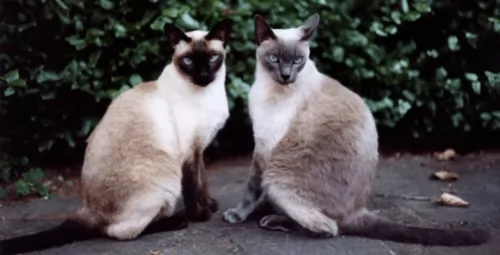 These cats have special nutritional needs and you want to be aware that obesity is a growing problem with modern-day cats. Make sure your Applehead has a healthy diet to maintain a healthy weight so that he keeps his lithe, lean looks.
These cats have special nutritional needs and you want to be aware that obesity is a growing problem with modern-day cats. Make sure your Applehead has a healthy diet to maintain a healthy weight so that he keeps his lithe, lean looks.
You might want to try a little bit of homemade food to enhance your Siamese cat's commercial food which is a mix of top quality meat-based wet- and dry food. You can speak to your vet about feeding your Applehead Siamese because you want to know which food is best for such a cat.
These days the best cat food manufacturers make sure that their cat foods are made up of tasty ingredients such as real chicken and whole brown rice formulated with the right balance of vitamins and minerals to meet the dietary needs of every cat breed and the season of life they are in.
Because of the Siamese cat’s short hair with no undercoat, the cat requires less brushing than other cats.
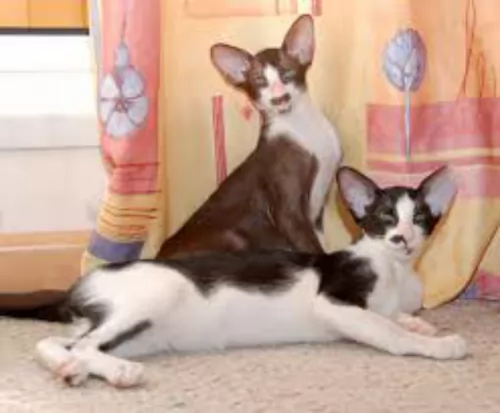 The Oriental Bicolor will require a brushing once a week. A good idea is to also take a warm, damp cloth and to wipe your cat down. It’s an excellent way to rid your cat of loose hairs as well as dust. The cat has a sparse coat, so brush him gently.
The Oriental Bicolor will require a brushing once a week. A good idea is to also take a warm, damp cloth and to wipe your cat down. It’s an excellent way to rid your cat of loose hairs as well as dust. The cat has a sparse coat, so brush him gently.
Other grooming requires nail clipping and checking inside his ears. If you clean his ears, be careful not to go deep into the ear. It is precisely why so many cat owners take their cat to the pet groomers where they can do these things professionally.
It’s very important to keep your Bicolor’s litter box spotlessly clean because like most cats, they won’t use their litterbox if it’s still got yesterday’s feces in it. It needs to be cleaned every day.
The Oriental’s diet is much like that of other cats – it has to be meaty. You can’t afford to not understand your feline pet’s dietary needs. Cats are carnivorous and they need commercial cat food that will be equal to fresh meat that they would normally find in the wild.
They need foods high in protein but they will still need some carbohydrates, amino acids, and vitamins, and minerals. Always go for the best quality pet cat foods because by buying the poorer quality ones you put your cat at risk of developing health problems. Never ever leave your cat without a constant supply of fresh, cool drinking water.
Supply your cat with all the things that make it a pleasure to have a cat. You don’t want to bring your pet home and only then start looking for things to make him at home. He’ll need food and water bowls, a nice warm, soft bed, a litter box, grooming accessories, collar, toys climbing tree and scratching pole.
Have your pet neutered or spayed to prevent unwanted kittens.
Make sure he is taken to the vet when ill. You shouldn't own a pet if you can't afford to pay vet fees. There are some cat illnesses that can make your cat very sick and uncomfortable. He should have his vaccines and also be treated for parasites.